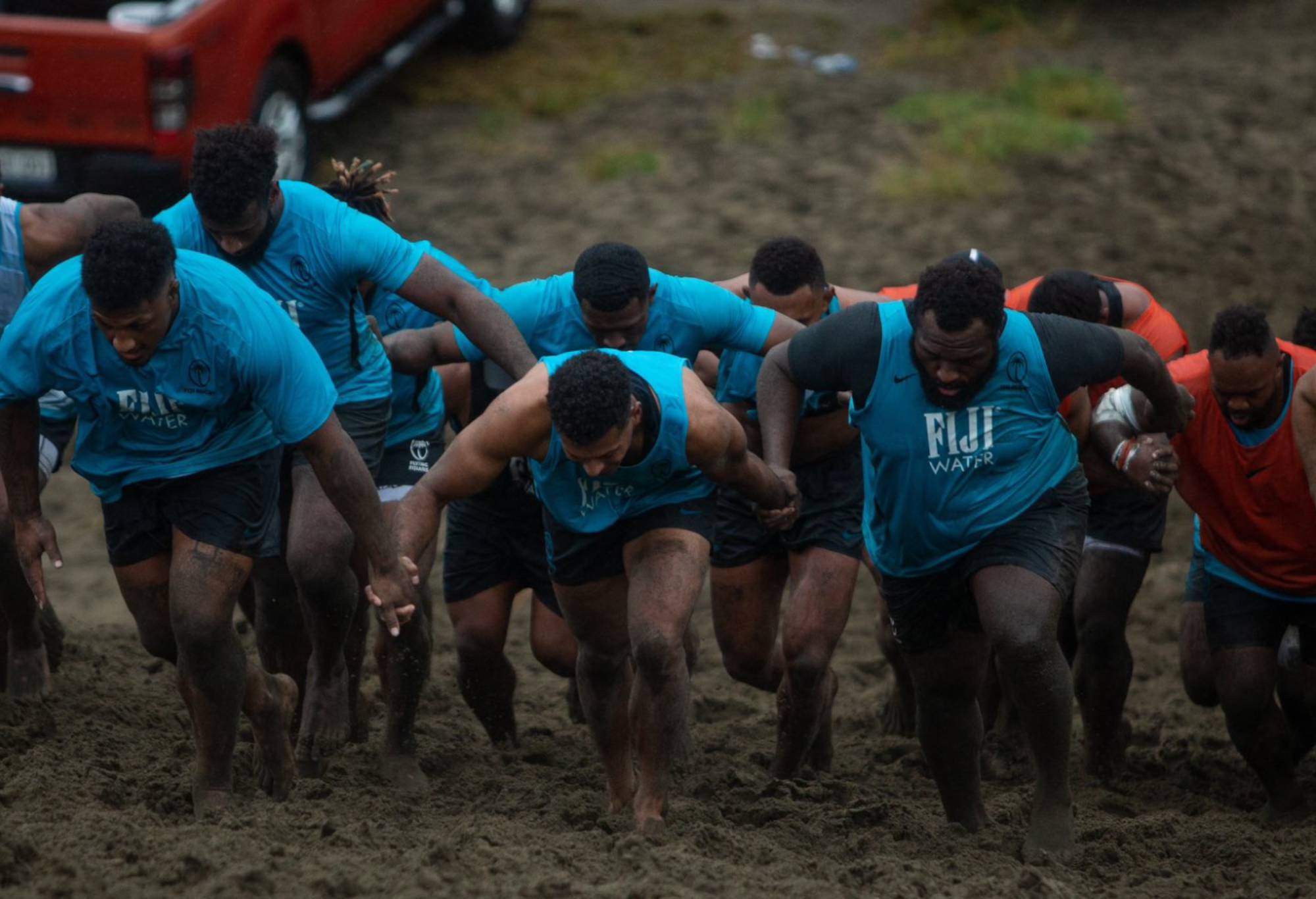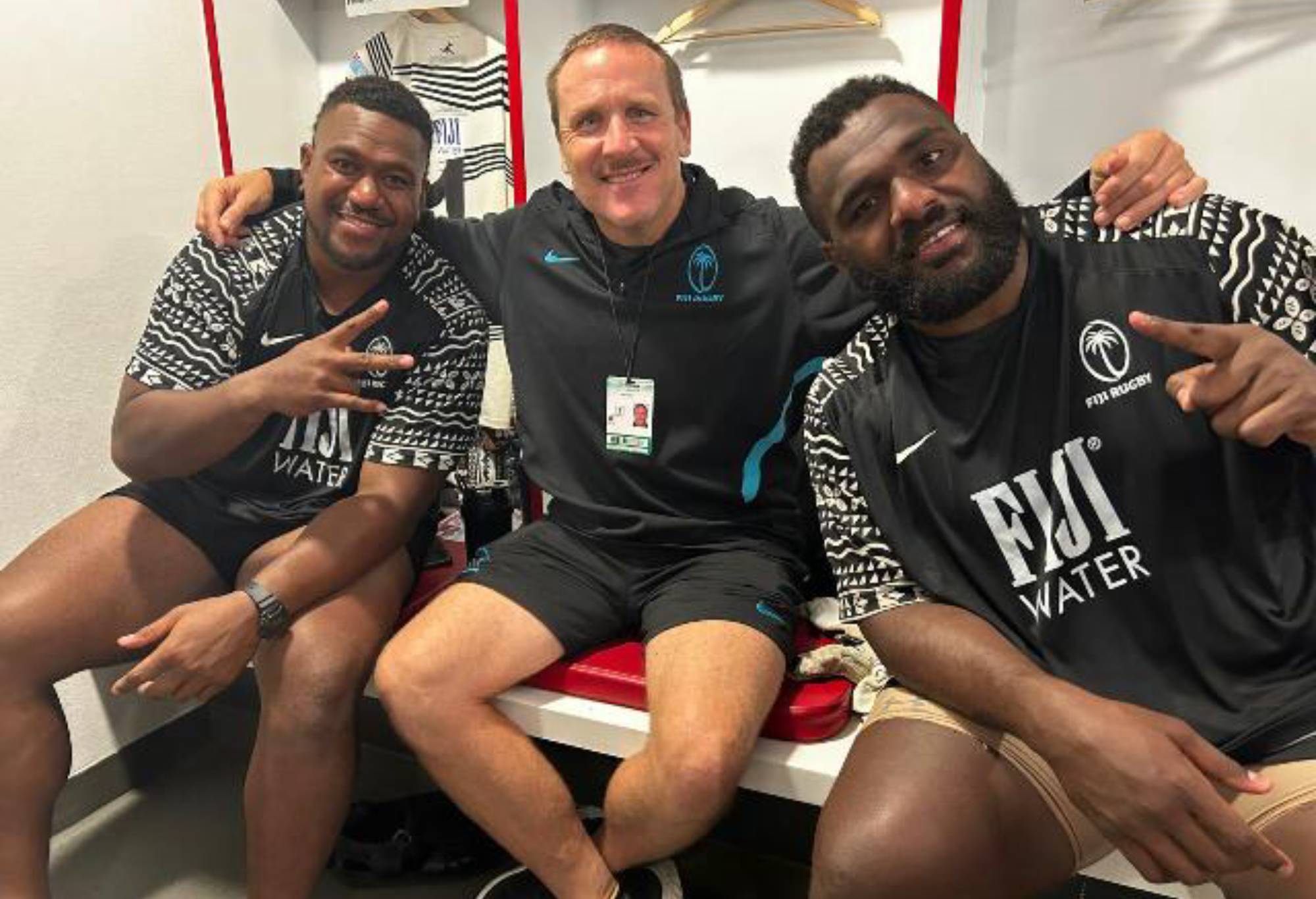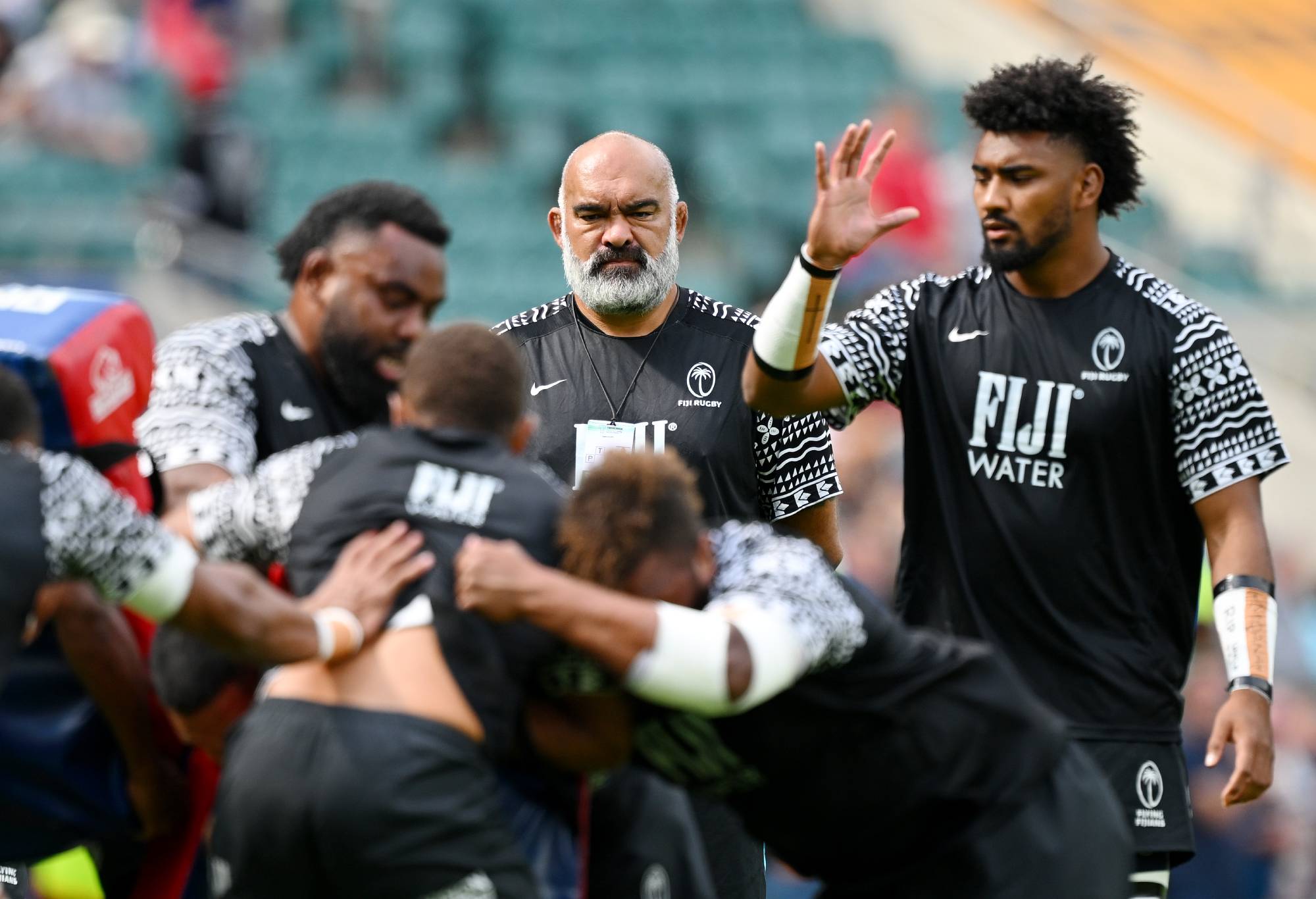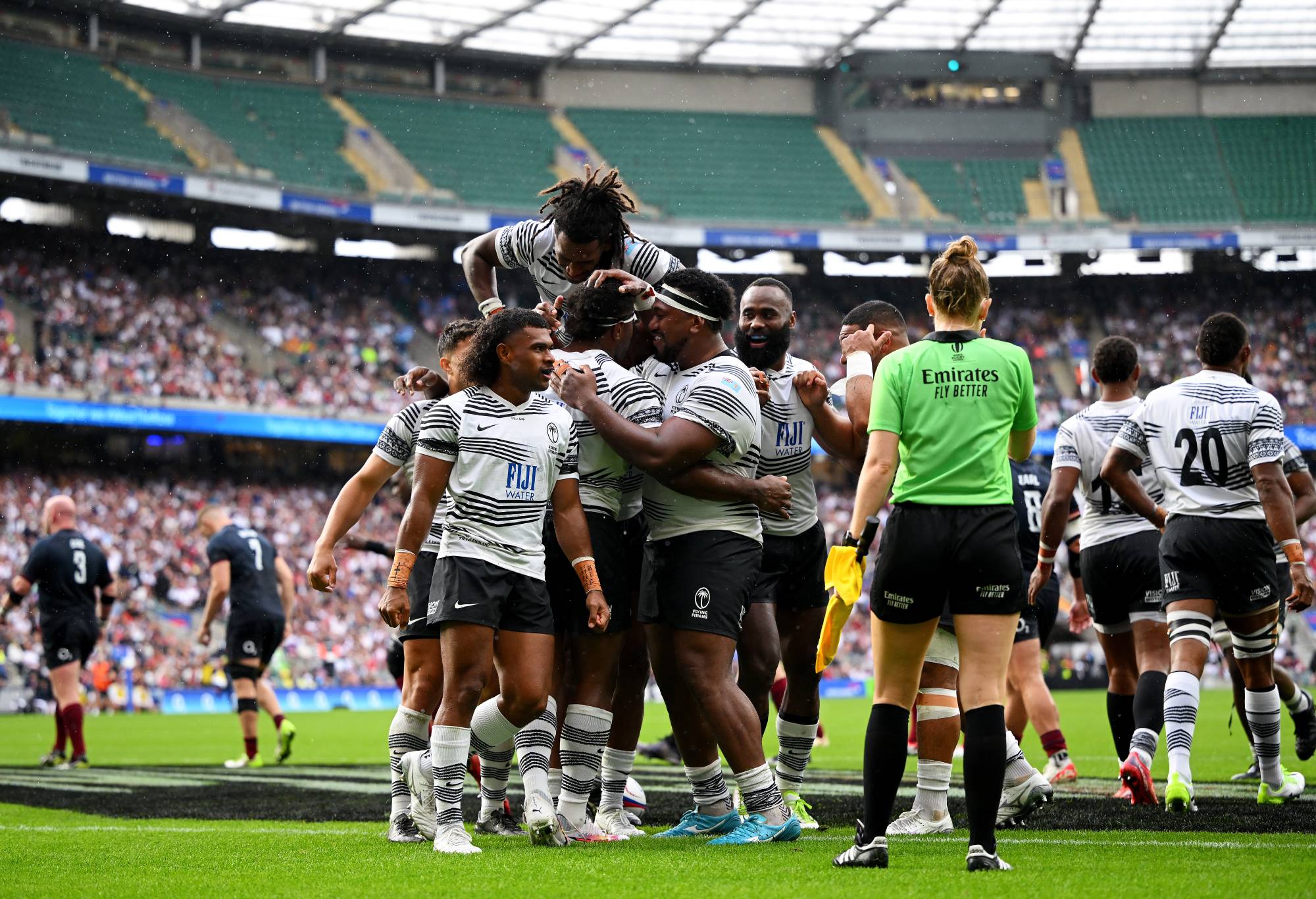COMPILATION: Eddie's best press conference moments from St. Etienne open training
Eddie Jones, Will Skelton and Carter Gordon talked about a lot of subjects after their first open training session, ahead of their first World…
Join The Roar
Become a member to join in Australia's biggest sporting debate, submit articles, receive updates straight to your inbox and keep up with your favourite teams and authors.
Oops! You must provide an email address to create a Roar account
When using Facebook to create or log in to an account, you need to grant The Roar permission to see your email address
By joining The Roar you agree to our Privacy Policy and Terms & Conditions
Login and get Roaring
Oops! You must provide an email address to create a Roar account
When using Facebook to create or log in to an account, you need to grant The Roar permission to see your email address
In the weeks before Fiji played their first match of the Pacific Nations Cup in early July, Simon Raiwalui recognised his squad needed to come together. They needed to reconnect and remember what it is to be “Fijian”.
So off they went.
Not to a five-star hotel like most tier-one international unions, but to a hall in Taveuni where the usual luxuries of queen-sized beds were replaced with little mattresses on the hard floor.
“We rocked into camp in Nadi, flew to Suva and we were about 28 hours on a ferry, bus and boat up to one of these outer islands where Semi Radradra’s from,” assistant coach Brad Harris told The Roar.
“We went into this village and slept in a big hall on the floor and lived like a traditional Fijian for a week. It was amazing.
“For a whole week, we trained in the village. We slept on the floor, communal open living in the middle of the village, trained, had the people come around to feed us. It was unbelievable.
“It was all about reconnecting to being a Fijian, what a Fijian feels like, who we represent; it was a real identity piece. And it was powerful, I can tell you that it was incredibly powerful.”

Fiji during a training camp at home before heading to the Rugby World Cup in France. Photo: Twitter
There in the heartland of Fiji, the Radradras of the world, earning more than $1 million per season and feeding villages back home out of respect, slept side by side in the middle of the hall with those earning less than a tenth of what the former NRL star turned one of Europe’s most feared and recognised players makes.
Then during the day, they would go to work.
Not on the flush grounds of Pennyhill Park or indeed Sanctuary Cove, where everything is served up on a platter but the undulating fields in some of the most remote parts of the world where the turf is soft and the risk for injury is high.
“We broke it right back down,” said Harris, who joined the Drua in 2018 when the Island Nation was invited into the then National Rugby Championship before helping Fiji claim gold at the Tokyo Olympics.
“The field, look, to be honest with you, if you said to an England or a Kiwi or a South African team, you’re going to have to train on this field, I reckon the players would have said, ‘We’re not going near it.’
“Our boys just got on with it, as they always do. They were a breath of fresh air, they embraced it and it was a wonderful week.
“We knew that there were going to be some challenges around what it might look like.
“As a coaching group, Simon led that magnificently. He just said, ‘We’ve got to cope with it, we’ll get on with it.’”
That togetherness was on show over the past two months as the Flying Fijians registered four wins from five matches, including a historic maiden victory over England at Twickenham, heading into this month’s World Cup.
Where England’s highly paid stars played like individuals, Fiji stuck together tight and eventually the pressure turned into points to see the Red Rose at Twickenham well before winter arrives.
But even before their stunning afternoon in London, the signs were strong a week earlier as they held in the fight against France in Nantes and showed they had their house in order against one of this year’s tournament favourites.
Yet, Fiji’s rise from 40-minute pretenders over the past couple of tournaments to World Cup contenders in 2023 hasn’t happened overnight.
Harris, the 49-year-old who played for the Gold Coast Breakers before following in the footsteps of Dan McKellar and John Mulvihill and heading to Ireland to become a player-coach, has seen first-hand the rise of Fijian rugby after joining from the Georgian national team in 2018.
More to the point, he has seen what can be done when a team experiences adversity, connects with one another and puts in the hard work.
Indeed, three years ago Harris spent months with the national sevens team essentially locked down and locked out from the rest of the world when COVID-19 got into the Island and saw players stranded from family and friends despite mere kilometres, not states, between each other.
“We said we were in lockdown in Australia but really you could wander around and do whatever you want. But over there, there were basically roadblocks. No one allowed in and out of town,” Harris said.
“We were in Suva at that point and we were staying in our accommodation and we were only allowed out to go down to the stadium to train.
“We had a makeshift gym in a car park. It was brutal.
“We had guys that were in lockdown from Suva, who were 5-10 kilometres from their home but couldn’t see their family. They couldn’t even talk to them through a fence or anything.
“A lot of those hardships sort of galvanised our group.
“There was a vivid time where the boys had just about had enough and they were about to walk out and break camp, so there were some hairy moments involved with that as well. But it was the making of us. We just connected tightly as a group.”

Brad Harris with Fiji’s starting props that beat England Eroni Mawi and Luke Tagi, who developed under the coach for the Drua in the NRC. Photo: Brad Harris
Despite the adversity being experienced, by living together they lived and breathed rugby.
Harris said it allowed the Fijian side to get a level of detail in them that they would not have been able to get otherwise.
Lo and behold, despite several players not ever playing in a global tournament or even leaving Fiji before heading to Japan, they shocked the world to claim back-to-back gold medals.
“That was probably the biggest thing that we managed to do well at that Olympics was we kept the flair, athleticism style of play, but we also built layers around it,” Harris said.
“We kicked for touch, we took lineouts, we played a bit more of a structured game, but we had a bit more balance to how we could beat teams as well and I think that took most of the teams by surprise. I don’t think they were ready for that from us.
“We built a game that was probably three or four layers of depth, where if this wasn’t happening, we can do it this way, we can do it that way, and we were just great.
“We had three or four guys that had not played in an international tournament that went and won an Olympic gold medal. The whole story was just unbelievable.
“They hadn’t even stepped off the island half of these blokes and they went over and won an Olympic gold medal in their first tournament. It was scary the amount of talent that we unearthed in that camp.”

Simon Raiwalui has Fiji tracking well ahead of the Rugby World Cup. (Photo by Clive Mason/Getty Images)
Harris believes Raiwalui, who took over from Vern Cotter earlier this year as the national coach after being their high-performance general manager, as well as the Drua head coach Mick Byrne, have been able to introduce a similar level of game understanding, detail and technical prowess to put the Flying Fijians in a similar state heading into the World Cup.
“Mick’s got a shitload of experience around skills and that type of area,” Harris said.
“Similarly to what we did with the Olympics, we’ve done with the Drua. We’re just looking to grow the players’ core skill sets, and he’s brought a real focus on that to the program.
“Simon’s always been great. He’s been on the Island for years, he’s been there the whole cycle. So, he’s been heavily involved in a lot of the programs I’ve been involved in, and he’s just got a great way about him. He’s Fijian and he’s really invested in these young kids in the pathway.
“He’s put a lot into developing this pathway on the island and probably pretty similar to myself, he’s seeing a lot of these kids that are four to five years in the Fijian pathway coming through now and I think he takes a tremendous amount of pride from that.
“As a head coach, what he does really well is he has a lot of faith in his assistants and he just lets you get onto your area and he backs you.
“He’s put a massive focus on the physical conditioning of the boys. That showed out in the PNC (Pacific Nations Cup) the hard work we’ve done in that area and it will hopefully hold us in good stead. We’re ready.”
While Fiji heads into the World Cup as Pool C’s highest-ranked side at sixth, Harris knows challenges await.
Having coached Georgia alongside Richard Graham, he has seen first-hand their mindset change from only wanting to win the set-piece battle to wanting to win the match.

Vinaya Habosi of Fiji celebrates with teammates during their win over England at Twickenham Stadium on August 26, 2023 in London. (Photo by Clive Mason/Getty Images)
Nor does he believe Wales and the Wallabies are in the holes they are in either.
But Harris recognises Fiji, who will meet Wales in a crucial first-up clash in Bordeaux on September 10 (September 11, 5am AET), have an opportunity in front of them.
“I think everyone understands the opportunity that is there for us – and it is significant,” he said.
“We’re only focusing on Wales. If we can get through that one, then anything could happen.
“The Wallabies are certainly going to be dangerous. I don’t read too much into the zero and five, I thought that was pretty good against the Kiwis. They’re starting to get some of their players back like Angus Bell.”
Having raced out of the blocks against Fiji in Sapporo four years ago before their usual second-half fade, Harris knows – and hopes – the building blocks they’ve put in place over the past few years ensures they aren’t run over the top like in decades gone by.
“In the last World Cup, Fiji had Australia wobbling at half time. We’ve spoken about that, about how good we were in that first half, but we’ve also spoken about the fact we know teams will probably expect to run over the top of us in the last 20 minutes, and that’s why we’ve had such a big focus on our conditioning and discipline, so we can finish over the top of teams rather than being run over,” he said.
Harris also recognises that their greatest strength can also be their Achilles heel and says ensuring they can counter oppositions wanting to slow the pace of the game down and wanting to go to set-piece will be crucial to their overall success.
“The thing that sets us apart from every other team in the world is our greatest strength. Our flair, our athleticism, our power; the way that we play is very unique. But it can also be one of our greatest weaknesses as well,” he said.
“Everyone fears us when we get our game going and when we’re on and we’re powerful, and we’re combative and we’re offloading and the pace of the game is just uniquely Fijian, but teams will have a clear strategy of how to probably inhibit the game getting to that level.”
After turning down several opportunities to accept roles elsewhere, Harris will join the Melbourne Rebels as an assistant coach following the World Cup.
But it wasn’t an easy decision to leave.
“I’m going to miss coaching the boys in Fiji because they are unlike any other group I’ve ever been involved with in terms of their outlook and their infectious nature and they make me a better person every day,” he said.
“We’re superficial, we look at materialistic things, and they just don’t have any of that. I think that’s what kept me going back.”
If Fiji are to shock the world at this year’s World Cup, rest assured it is the culture built and fostered under Raiwalui that their success comes from.